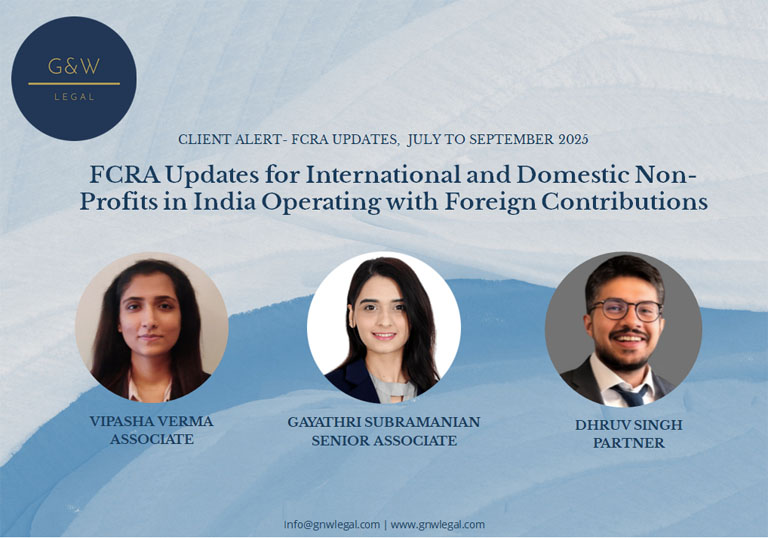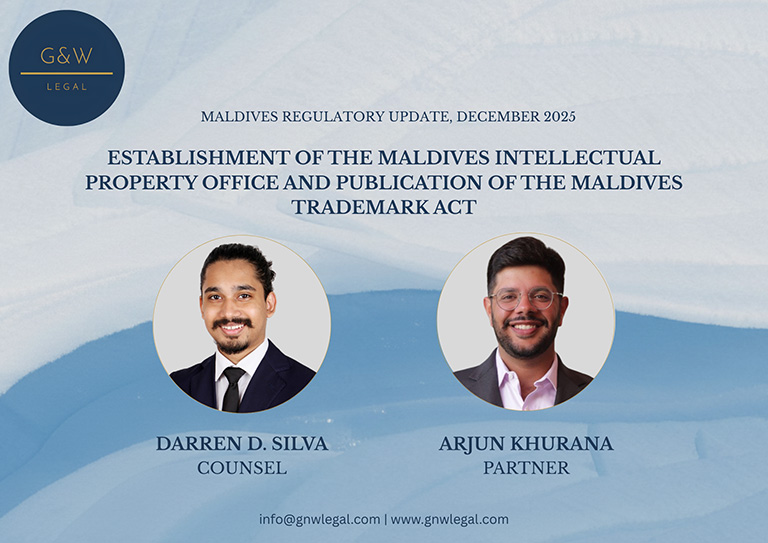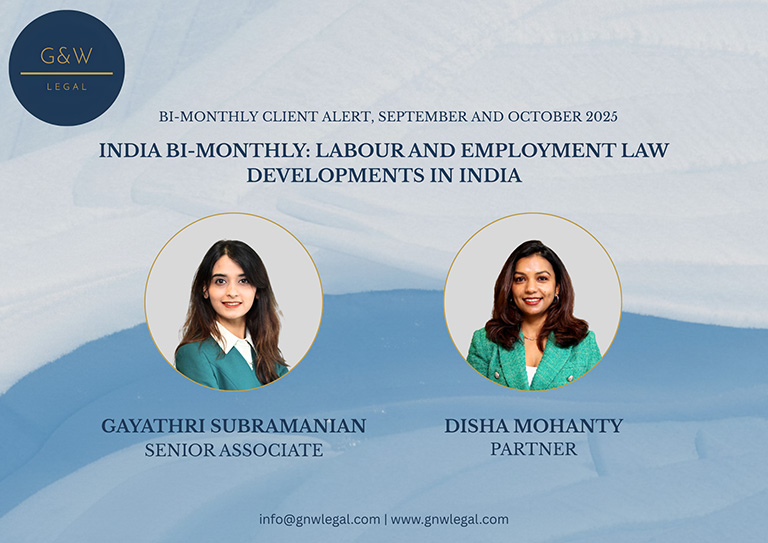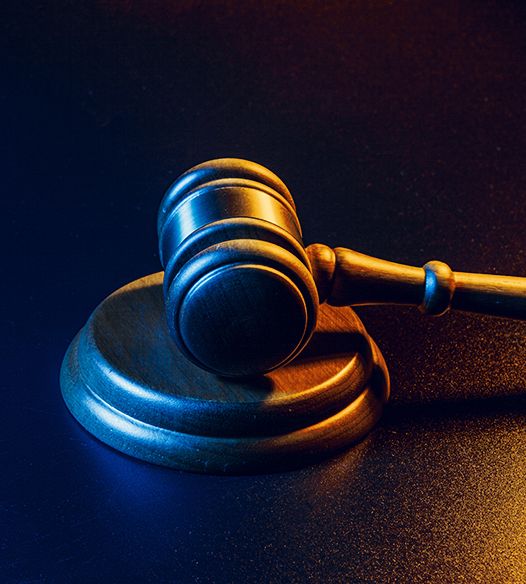
Background
Receipt of foreign funding by non-profits (i.e., NGOs) in India is regulated through the Foreign Contribution(Regulation) Act, 2010 (“FCRA”), the primary tool of the Indian Government for the regulation of foreignhospitality. This is done through the Ministry of Home Affairs (“MHA”) – the organ responsible for overseeingcompliance.
Definitions of foreign contributions and foreign hospitality have deliberately been left extremely wide in theirambit, thereby providing the government with wide ranging powers and control.
MHA Clarifies Timelines for Timely Renewal of FCRA Registration Certificates
The MHA has recently issued certain clarifications regarding the timely submission of application for renewalof registration certificates granted under the FCRA.
Section 16(1) of the FCRA requires every organisation granted a certificate under Section 12 of the FCRA toapply for renewal of such certificate within 6 (six) months prior to the expiry of the validity of the certificate.Further, Section 16(3) of the FCRA provides that the Central Government shall ordinarily renew the certificatewithin 90 (ninety) days from the date of receipt of the renewal application.
However, the notification states that organisations have typically been submitting these renewal requestsless than ninety days prior to the expiry of their registration certificate. The Central Government isconsequently not able to sufficient scrutinize these renewal requests/applications and obtain necessary inputfrom security agencies before these registration certificates expire. As a result, registration certificates aredeemed to have lapsed on their expiry date, while renewal applications remain pending. Consequently, inaccordance with Rule 12(5) of Foreign Contribution Regulation Rules (“FCRR”), such organisations are unableto receive or utilise foreign contribution until renewal is granted, which disrupts their ongoing activities.
The notification asks that organisations submit their renewal applications well in advance and always at least4 (four) months before the expiry of their registration certificate.
Supreme Court Upholds Madras High Court Ruling that Procedural Lapses Unaccompanied by Misuse ofFunds Cannot Be Basis to Reject Renewal of Registration Applications
In a recent case, the Supreme Court (“SC”) dismissed a challenge by the Union of India to a Madras HighCourt (“MHC”) order in the case of Ellen Sharma Memorial Trust & Or v. The Director, FCRA Wing & Or.
In this case, the MHC had held that an NGO’s inadvertent failure to comply with a procedural amendment fora short period does not result in a refusal to renew a registration certificate under the FCRA, especially if thedefault did not result in any misuse or personal gain of the organisation. The organisation’s renewalapplication had earlier been refused since the government alleged that the organisation had contravenedprovisions of the FCRA. However, the MHC noted in its judgement that the provision alleged to have beencontravened had only been made effective as a law five months prior to the filing of the renewal application.Thus, the MHC held that while ignorance of law is no excuse, mere procedural irregularities alone,unaccompanied by substantive misconduct, cannot justify denial of renewal.
Aggrieved by this judgment of the MHC, the Union of India challenged the order before the SC. The SCconsidered the facts and reasoning of the MHC and held that there is no finding of any abuse of funds ormisappropriation by the organisation. It reprimanded the Union of India for harassing the organisationwithout any strong evidentiary basis, and directed them to monitor, keep a check, let the organisation filetheir accounts annually without complicating things further.
In essence, the SC’s decision reinforces that minor procedural lapses cannot outweigh an organisation’s bonafides in the absence of any misuse or misconduct. It upholds the principle that regulatory actions must befair, proportionate, and evidence based.
Ministry of Home Affairs Clarifies No New Bans on NGOs Engaging in Publications or News-RelatedContent
The FCRR was amended by a notification dated 26 May 2025, wherein new requirements were included forapplicants seeking registration under the FCRA.
One of the requirements was that in case the organisation applying for registration is engaged in publicationrelated activities or if publication activities are among its chief aims and objectives as stated in theMemorandum of Association or trust deed – an undertaking from the Chief Functionary regarding compliancewith Section 3(1)(g) of the FCRA has to be enclosed in the application for registration in the prescribedformat.
Section 3(1)(g) of the FCRA prohibits organisations engaged in the production or broadcast of audio news oraudio-visual news or current affairs programmes through any electronic mode, or any other mode of masscommunication, from accepting any foreign contribution.
Further, as per the amendment, if the publication of the organisation is registered with the Registrar ofNewspaper for India (RNI), a “Not a Newspaper” certificate from the RNI shall be submitted in the prescribedformat.
Pursuant to this, a question pertaining to this requirement was put forth to the Minister of Home Affairs inthe monsoon session of the Lok Sabha. Essentially, it was questioned whether the government hasamended the FCRR to prohibit NGOs receiving foreign funding from publishing newsletters or any newsrelated content, whether such NGOs are not required to obtain a certificate from the Registrar ofNewspapers for India affirming that they do not circulate news content and the rationale for suchcertification, and whether the move may impact the freedom of expression and dissemination of publicinterest information by civil society organisations.
The MHA answered that the prohibition concerning news and current affairs already exists under the FCRAand no new prohibition has been included. The recent amendments are procedural in nature and areintended to improve application processing efficiency without altering the substantive legal position underthe FCRA. Earlier, the documents required under the amended FCRR were sought at a later stage of theapplication process. Now, these documents are required to be submitted at the initial stage of filing theapplication to ensure procedural clarity and to streamline and expedite application processing. Thus, theseamendments do not impose any new restrictions on NGOs.
- Notification dated 30 September 2025, FCRA Online Services managed by Ministry of Home Affairs athttps://fcraonline.nic.in/home/PDF_Doc/fc_notice_30092025.pdf, retrieved 18 October 2025.
- Union of India vs. M/s Sharma Centre for Heritage Education, SLP(C) No. 26284-26285/2025, Supreme Court of India, 19September 2025.
- CMA No. 746 of 2022 & W.P. No. 4887 of 2022, High Court of Madras, 27 June 2025.
- Notification dated 26 May 2025, FCRA Online Services managed by Ministry of Home Affairs at https://fcraonline.nic.in/home/PDF_Doc/fc_gaz_27052025.pdf, retrieved 18 October 2025.
- Government of India, Ministry of Home Affairs, Lok Sabha – Unstarred Question No. 1476 dated 29 July 2025, https://sansad.in/getFile/loksabhaquestions/annex/185/AU1476_avyXVc.pdf?source=pqals, retrieved 18 October 2025.
Disclaimer: This update is for general information purposes only. It does not purport to provide comprehensive legal or other advice. The publisher and the contributors accept no responsibility for losses that may arise from reliance upon information contained in these publications.















